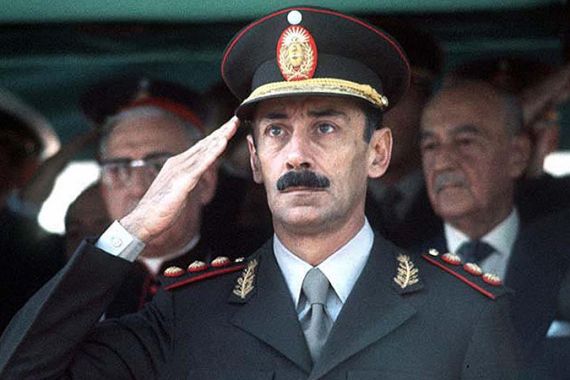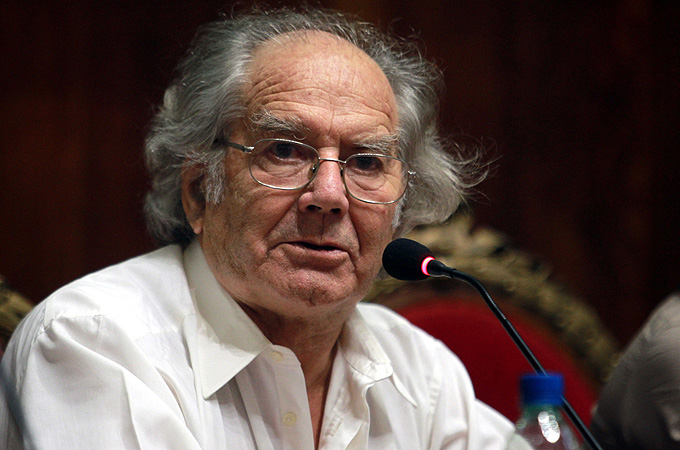Argentine military leader Videla dies at 87
Jailed architect of repressive system that left at least 9,000 people dead in nation’s “Dirty War” remained unrepentant.

Jorge Rafael Videla, the military leader who ruled Argentina during its “Dirty War”, has died at the age of 87 while serving a life sentence in prison for crimes against humanity.
Videla, who rose to power in a 1976 coup and was the first president to head the military government that “disappeared” thousands of suspected leftists from 1976 to 1983, died in in his sleep in Marcos Paz prison on Friday, a prison official said.
The father of seven later took full responsibility for kidnappings, tortures, deaths and disappearances when he was tried again for crimes, including the systematic theft of babies born to political prisoners in secret torture centres.
Videla said last year that the crackdown he oversaw was the price that Argentina had to pay to remain a republic.
“War, by nature, is cruel,” Videla said. “An internal war, between brothers, is especially cruel.”
After the coup of March 24, 1976, Videla quickly became the architect of a repressive system that killed about 9,000 people, according to official figures compiled after democracy returned to Argentina in 1983.
Human rights activists believe the real number was as high as 30,000.
The “Dirty War” introduced two terms to the global lexicon: “disappeareds”, people kidnapped and never heard from again, and “death flights”, in which political prisoners were thrown, drugged but alive, from navy planes into the sea.
Unrepentant
Videla’s government held pregnant prisoners until they gave birth and then killed the women while arranging for illegal adoptions of their babies, usually by military or police families.
 |
| Adolfo Perez Esquivel, the Nobel Peace Prize winner, has called for the ‘Dirty War’ probe to continue [AFP] |
He was convicted and sentenced again last year, to a 50-year-term, for the thefts of the babies, which occurred hundreds of times.
An unrepentant Videla described himself as a “political prisoner” during the trial.
“The women giving birth, whom I respect as mothers, were militants who were active in the machine of terror,” Videla said in his closing remarks.
“Many used their unborn children as human shields.”
‘Beyond Videla’
Adolfo Perez Esquivel, who spent 28 months in prison during Videla’s rule and won the Nobel Peace Prize for his work documenting Videla’s crimes, urged Argentina’s justice system to keep investigating the “Dirty-War” era.
“It goes beyond Videla,” Esquivel told Radio Once Diez. “It’s a political system that they implemented throughout the country and in Latin America.”
Videla’s regime, known as the Process of National Reorganisation, ostensibly fought against armed-leftist fighters, but it soon pursued political opponents, union members, student activists and social workers.
He told journalists Maria Seone and Vicente Muleiro, authors of his 2001 biography The Dictator, that the three essential elements of his campaign were clandestine detention centres, torture to obtain information, and the subsequent disappearance of the prisoners, so that they “don’t have identity”, and are “neither alive nor dead”.
Falklands War
Videla’s government closed Congress, banned political parties, intervened in unions and universities, and imposed media censorship.
He retired in 1981 and handed leadership to a succession of generals as the regime was weakened by inflation, a sluggish economy and explosive growth in foreign debts after nationalising the debts of leading private corporations.
It launched a war against Britain for the Falkland Islands, which Argentina claims as the Malvinas and considers part of its territory.
That military defeat hastened the return of democracy on December 12, 1983.
Series of trials
With constitutional rule restored, then-president Raul Alfonsin launched a probe into the regime’s crimes and its report, titled “Never Again,” served as the basis for a trial which ended with Videla’s first life sentence in 1985.
President Carlos Menem pardoned Videla in 1990, who was free until 1998, when a judge charged him over the baby thefts.
He spent a month in prison before asserting the right that Argentines older than 70 have to house arrest pending trial.
The Supreme Court nullified the amnesty laws in 2003 and fresh human rights investigations began.
Videla was jailed for life in 2010 for killing 31 political dissidents.
The baby thefts conviction, with its 50-year sentence, was handed down in 2012.
All of the crimes involved in both convictions were considered crimes against humanity under Argentine law.
Videla died while standing trial in a case focused on kidnappings and killings related to Operation Condor.